6 Books That Will Deepen Your Understanding of the Indian Constitution
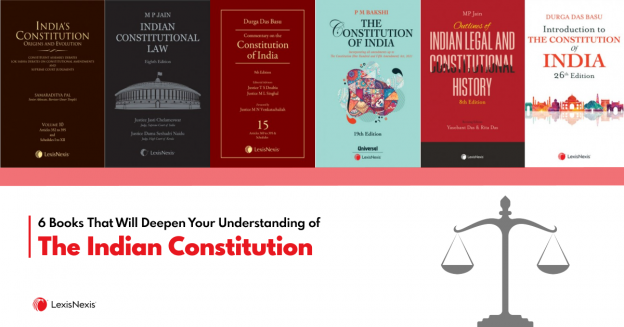
Formulated on January 26, 1950, the Constitution of India is the world’s largest constitution and is the supreme law of India. It is like a comprehensive document that helps legal practitioners to understand the fundamental political code, powers, procedures, structure, and duties of government institutions. It also symbolizes our democratic ideals and its commitment to upholding the values of justice, liberty, and equality. We have one of the best books for the Indian constitution that will deepen your knowledge and understanding of the Indian constitution. We will discuss the same in this article.
Understanding the Indian Constitution is crucial not just for law professionals and students, but for all Indian citizens; owing to various reasons; some of these include:
- It guarantees fundamental rights: As a citizen, you must know what rights and duties you have as an Indian. The Constitution is the foundation of our legal system and guarantees fundamental rights to all its citizens. Having an understanding of the same is pivotal for each individual.
- Guides government actions: For any law professional, it is vital to read the best books for Indian constitution and understand how a government functions. Different functions like the legislature, executive, and judiciary have different powers, functions, and limitations. Understanding these is critical for any law professional for thorough research and building of cases for their clients.
Understanding the Indian constitution is critical for preserving democracies, shaping public policies, and fostering national unity. Additionally, it is vital for citizens to assert their rights, monitor the government’s actions, uphold democracy, participate in policymaking, and foster national unity. This article will also cover the best books for the Indian constitution to help you deepen your understanding and knowledge as a law student and a practitioner.
Indian Constitution books for students
Book 1- “Introduction to the Constitution of India” by DD Basu
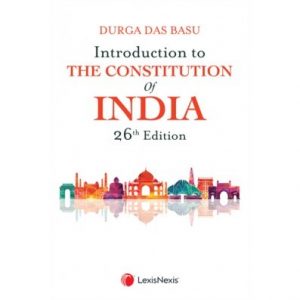
“Introduction to the Constitution of India” by D.D. Basu is a one-stop solution if you are looking out for a comprehensive tool that helps you with an in-depth analysis of the Indian Constitution. This book is highly recommended for students, lawyers, judges, and anyone interested in the Indian legal system and pursuing a career in this field.
Author and their background
Durga Das Basu was a renowned Indian jurist, constitutional expert, and author. He is famous for his significant work and contributions in the field of law and is widely known for his authoritative and comprehensive book–Introduction to the Constitution of India–considered one of the best books for the Indian constitution.
Key insights and takeaways from the book
- Offers a systematic exposition of the constitutional documents, arranged under logical chapters & headings.
- Serves as an introductory study on the Indian Constitution for general readers, statesmen, journalists, politicians, students, administrative authorities, and Public Service Commission & other competitive examination aspirants.
- Traces the history of the Indian constitution since the Government of India Act of 1858, analyses the provisions of the present Constitution, & explains the interrelation between the diverse contents.
- Gives an account of the working of each of the provisions of the Constitution during the first decade, with reference to statutes & decisions wherever necessary, together with a critical estimate of the trends.
- Analytical table of contents, marginal notes, index, and reference tables further aid understanding
- Includes notable judgments of the Supreme Court of India
Why this book is important for understanding the Indian Constitution?
The book–Introduction to the Constitution of India–is undoubtedly one of the most widely used and pioneering books in the field of law, Indian Polity, and the Constitution. It covers various aspects of the Constitution, including its historical background, philosophy, principles, and structure. The book has been revised close to 20 times till now and the latest edition is easily available at Lexis Nexis Store. This book also includes most of the notable judgments of the Supreme Court & High Courts that you can find in all the latest editions available in our law bookstore.
Book 2- “Outlines of Indian Legal and Constitutional History” by MP Jain
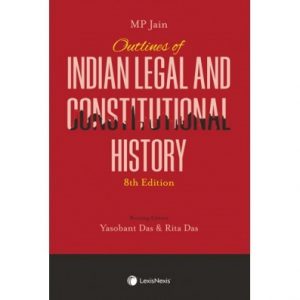
“Outlines of Indian Legal & Constitutional History” by MP Jain–your comprehensive guide and a handy resource if you want to know about the developments of the Indian legal system and the constitution from its inception till date–it is one of the best books for the Indian constitution. The book also talks about the challenges faced by Indian constitutionalism and what the future looks like w.r.t. legal reforms in India. The book is a must-read for law students, academicians, and legal professionals.
Author and their background
M.P. Jain, a renowned author, and legal scholar known for his finest contributions to the field of law in India–has received numerous honours and awards throughout his career; some of these include Padma Bhushan (1991) and the Padma Vibhushan (2020)–highest civilian honours awarded by the Indian government. Born on January 1, 1930, in Jodhpur, Rajasthan, M.P. Jain has taught at various universities and helped many law professionals upscale their careers. The University of Rajasthan, the University of Jodhpur, and the National Law School of Indian University are a few to name.
Key insights and takeaways from the book
- It’s one of the best books for the Indian constitution. Itcontains various chapters on the modern judicial system, from the Privy Council to the Supreme Court, high courts, development of law, personal laws, codification, law reform, law reporting and the legal profession, legal education, development of constitutional law, development of civil law, criminal law, etc. with reference to case law and exhaustive commentary.
- The book is thoroughly updated and revised with contemporary developments, recent amendments, and important case law
- Essential reference aid for law students, researchers, academicians, judges, advocates, and people preparing for competitive examinations.
Why this book is important for understanding the Indian Constitution?
Understanding the history of the constitution of India is as important as keeping yourself updated about the amendments in the constitution and laws related to it. The book is like a bible for all law students and practitioners.
Book 3- “Constitution of India” by PM Bakshi
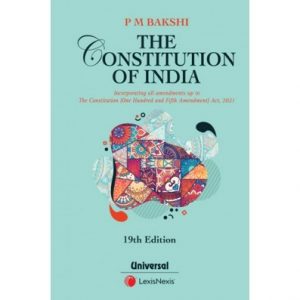
“P.M. Bakshi” is the author of the book “The Constitution of India“. This book is considered to be one of the most comprehensive and authoritative books that talk about the historical background of the Indian constitution, its philosophy, its basic structure, its fundamental rights and duties, its directive principles of state policy, and its federal structure. It is one of the most famous books in the field of law and acquires the space for the best books for the Indian constitution in our online pool of law books and resources.
Author and their background
P.M. Bakshi is an Indian author who has been popular for his teachings across various colleges and universities in India. He owns a master’s degree in political science and is known for his comprehensive and lucid writing style that keeps the readers engaged with his thoughts and experiences. His book The Constitution of India is one of his best contributions to the Indian legal system and a handy resource for all law students and practitioners in the country.
Key insights and takeaways from the book
Constitution of India by P.M. Bakshi is considered one of the best books for the Indian constitution. The book provides a detailed account of the working of the Constitution, including:
- Concise commentary that is article-wise on the Constitution of India.
- Up-to-date with all legislative amendments – beginning from 1951 up to the latest Amendment.
- Incorporated with important judicial pronouncements.
- Each article is followed by concise notes to aid readability and understanding.
Why this book is important for understanding the Indian Constitution?
The book contains useful and updated information on the elemental political principles and protocols followed by government bodies. It establishes the basic rights and duties of the citizens of the nation, which makes it all the more essential book for all law practitioners and students practising across different parts of the country.
Constitution titles for Practitioners:
Book 4- “Commentary on the Constitution of India” by D.D. Basu
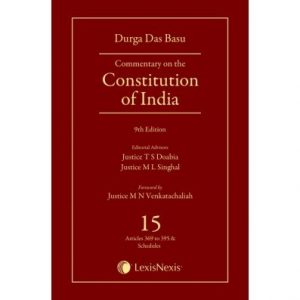
“Commentary on the Constitution of India” is one of the best books on the Indian constitution and is widely accredited as a comprehensive book on the subject and written by D.D. Basu, this book adopts an interdisciplinary approach; covering all important aspects–philosophical, sociological, political, and legal–makes it absolutely necessary law resource for Lawyers, Judges, Constitutional Law Experts, Law Students, and all practitioners in this field.
Author and their background
Durga Das Basu was a renowned Indian jurist, constitutional expert, and author. He is popular for his significant work and contributions in the field of law and widely known for his authoritative and comprehensive book–Introduction to the Constitution of India–considered one of the best books for the Indian constitution.
Key insights and takeaways from the book
As one of the most widely used & best books for the Indian constitution, one of the unique features of the book is its comprehensive coverage of the case law related to the Indian Constitution. It also covers:
- Critical and comparative analysis of the provisions of the Indian Constitution and examines them from philosophical, sociological, political as well as legal perspectives.
- It also covers Articles 226 to 232 of the Constitution, including the latest cases, legislative amendments, and current developments in constitutional law.
- Includes all notable cases of the Supreme Court, as well as various High Courts.
- Provides a detailed synopsis for easy navigation and reference.
- An indispensable source of reference to Constitutional Law Experts, Judges, Lawyers, Officials of Central and State Government Law Departments, Academicians, Administrators, and all such individuals who are in any way concerned with the working of the Constitution of India.
Why this book is important for understanding the Indian Constitution?
Considered one of the best books on the Indian constitution, “Commentary on the Constitution of India” is a critical resource for anyone interested in understanding the Indian Constitution in-depth and its developments so far. The book is widely regarded as a comprehensive and updated resource for law students, lawyers, judges, and academics alike.
Book 5- Indian Constitutional Law by MP Jain
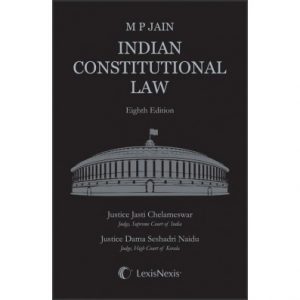
“Indian Constitutional Law” is written by M.P. Jain, an Indian author and legal scholar. The book is widely regarded as a standard textbook on the multi-dimensional subject of constitutional law of India that covers all important aspects of the constitutional law of the Republic of India, amendments, and reject updates–presented most comprehensively and systematically. It is a must-must for all law students, legal practitioners, lawyers, and judges across the country.
Author and their background
M.P. Jain, a renowned author, and legal scholar, known for his finest contributions to the field of law in India–he has received numerous honours and awards throughout his career; some of these include Padma Bhushan (1991) and the Padma Vibhushan (2020)–highest civilian honours awarded by the Indian government. Born on January 1, 1930, in Jodhpur, Rajasthan, M.P. Jain has taught at various universities and helped many law professionals upscale their careers. The University of Rajasthan, the University of Jodhpur, and the National Law School of Indian University are a few to name.
Key insights and takeaways from the book
It’s one of the best books for the Indian constitution that covers various aspects of the Indian Constitution, including:
- Provides crucial documents, including the historical development of the Indian Constitution
- The chapters on the Union and State Judiciary have been thoroughly revised and, to a large extent, re-written in view of the developments over the last decade
- The chapter on financial relations has been thoroughly revised and updated on account of the introduction of the Goods and Services Tax
Why this book is important for understanding the Indian Constitution?
“Indian Constitutional Law” is one of the best books for the Indian constitution. It is the go-to place for all law students looking to enhance their understanding of the Constitution, its development to date, and how it works as an essential tool to help them deepen their knowledge on the subject.
Book 6- India’s Constitution – Origins and Evolution by S. Pal
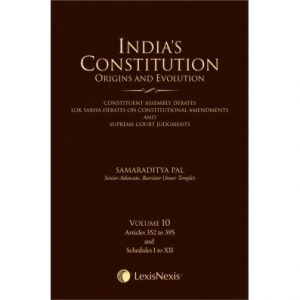
“India’s Constitution: Origins and Evolution” by S. Pal is considered the one of the best book for the Indian constitution. Samaraditya Pal (S. Pal) has provided a detailed analysis of the making of the Indian Constitution in this book, covering its origins and the evolution of each provision of the Constitution of India. From the amendments that originated through Constituent Assembly Debates, Lok Sabha Debates, and significant Supreme Court judgments to the comparison between the vision of the craftsmen of the Constitution and the most relevant interpretation by the Supreme Court–this book covers it all. It is needless to say why this book secures a place in the library of each law practitioner, student, lawyer, and judge in the country.
Author and their background
The author, S. Pal, alias Bacchu Pal was one of the most senior Indian advocates and barristers of the Calcutta High Court. He was born in Kolkata in 1938 and acquired his barrister degree from Inner Temple, London. He was considered one of the finest constitutional law experts in the country, a renowned historian and political scientist specializing in Indian politics and constitutional law and is widely known for his contributions to the Indian legal fraternity.
Key insights and takeaways from the book
It covers a wide range of topics, an article–wise analysis of the Constitution in light of the:
- Constituent Assembly Debates (CAD) – where the Constituent Assembly Members questioned and challenged each other on the proposed Articles in the Draft Constitution.
- Draft Constitution (presented by the Drafting Committee for consideration by the Constituent Assembly on 4 Nov 1948).
- Lok Sabha Debates on Constitutional Amendments
- Important Supreme Court judgments the analysis of each of the Articles in the Constitution comprises of:
- Overview – Author’s comment on the evolution of the Article
- Articles in the Constitution of India
- Corresponding Article in the Draft Constitution
- Relevant extracts from the CAD
- Relevant extracts from the Lok Sabha Debates on Constitution Amendment Acts (vi) Essential extracts from Supreme Court judgments”
Why this book is important for understanding the Indian Constitution?
In addition to its historical analysis, the book is widely used by law students and practitioners and is considered the best book for the Indian constitution. It discusses the Constitution’s strengths and weaknesses, making it a valuable resource for all- students, scholars, and policymakers interested in Indian politics and constitutional law.
Recap of the all 6 books and their importance
Here is a recap of the key features of each book discussed and why it is important for you to have it in your collection of law books and place these at the top.
- Introduction to the Constitution of India by DD Basu: This book is considered one of the best books for the Indian constitution. It covers all aspects of the Constitution, including its history, features, and amendments.
- Outlines of Indian Legal and Constitutional History by MP Jain: The book covers various topics, including the ancient Hindu legal system, British colonial rule and its impact on Indian law, the Indian Constitution and its amendments, and the role of the judiciary in shaping Indian jurisprudence.
- Constitution of India by PM Bakshi: It includes important landmark judgments of the Supreme Court and other constitutional bodies that have shaped the ER of the Constitution over time.
- Commentary on the Constitution of India by D.D. Basu: It provides a detailed analysis of the Indian Constitution and its various provisions. It covers the historical background, philosophy, and structure of the Constitution, as well as the fundamental rights and duties of citizens.
- Indian Constitutional Law by MP Jain: The book is widely regarded as a standard textbook on constitutional law in India and is used by judges, lawyers, and law students nationwide.
- India’s Constitution – Origins and Evolution by S. Pal: This covers a variety of topics, including the political and social forces that shaped the Constitution, the debates and negotiations that took place in the Constituent Assembly, and the role of key players such as Jawaharlal Nehru, Sardar Patel, and Dr. B.R. Ambedkar in the drafting process.
Final thoughts on the significance of understanding the Indian Constitution
India’s Constitution is one of the longest and most detailed constitutions in the World. Crafted in the year 1950, the constitution has evolved multiple times and is treasured like a bible by everyone in the Indian legal system, irrespective of their position or hierarchy; it is perative for all legal practitioners and students to have a thorough understanding of the Indian constitution–not just to be aware of their rights and duties–but be well-informed, to be able to help their clients with utmost knowledge, experience, deep research, and parity.

